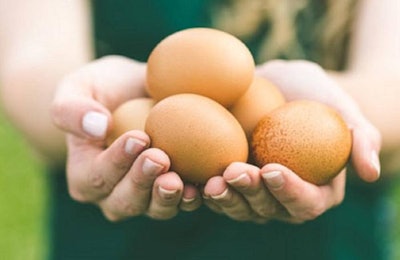
Some U.K. food producers are facing an uncertain future. As one of the sectors that will not receive protection from imports in the form of tariffs, the egg industry association says its members will be “massively undermined” by imports that would not be allowed under the production and quality standards required by domestic producers.
In less than a month, voters in Britain will take part in a general election to choose the next government. If the Conservative party is re-elected, Prime Minister Boris Johnson will likely proceed with his plan for Brexit — the U.K.’s leaving of the European Union (EU). And he will likely also aim to deliver on his promise to ensure that the transition period will end in December of 2020.
Experts say that it is highly unlikely that a trade deal can be negotiated and agreed between the country and the EU in such a short time period. A likely consequence is that the U.K. will leave the protections to trade provided within the Union, and be open to free trade with all other countries.
Despite intense lobbying by the British Egg Industry Council (BEIC), eggs were not included among the government’s most recently published list of “no deal” tariffs.
This leaves domestic producers at risk of a flood of imports from other countries where eggs can be produced much more cheaply, and to lower standards of animal welfare and environmental protection, reports the Telegraph.
“The government has said it made its decision on the assumption that eggs and egg product imports from countries with a lower offer price will lead to cheaper food in the U.K.,” said Mark Williams, BEIC’s chief executive. “This may be true but at significant cost to British agriculture – and the UK’s reputation for quality, safety, and high levels of animal welfare and environmental protection.”
This decision appears to be counter to the announcement from the agriculture department (Defra) undertaking to maintain animal welfare standards following Brexit.
As much as 80% of current animal legislation in the U.K. comes from EU law, according to the animal welfare organization, the Royal Society for the Prevention of Cruelty to Animals (RSPCA).
Of the around 40 laws in this area, 17 are related to farm animals. Brexit puts the country's animal welfare standards at risk, according to the RSPCA.
Import levies offer protection to EU egg producers
Legislation mandating how laying hens are kept varies around the world.
Costs of shell egg production in the EU are raised by 16% by additional legislation covering particularly animal welfare and environmental protection, according to Wageningen University and Research in the Netherlands. Main drivers for the higher costs are the EU’s ban on battery cages, and lower maximum permitting stocking density.
Within the EU, there is some variation in costs arising from regulatory differences. However, the average cost of production of shell eggs in the Union is between 11 and 24% higher than potential exporters such as the U.S., Ukraine, Argentina, and India. For egg products, the non-EU countries are even more competitive, and freight costs would also be lower than for shell eggs, which are both fragile and highly perishable.
Currently, import levies in place in the EU constrain incoming trade. However, the Wageningen study revealed that if import levies were to be lifted altogether—as would be the case for the UK under a “hard Brexit” — all four countries would be able to export whole egg powder at considerable cost advantage compared to domestic producers.
UK egg production trends
Shell egg production is currently more than 3% higher this year than in 2018, according to the latest statistics from Defra. This continues an upward trend in output over recent years. At just under 8 million cases (2.88 billion eggs) in the third quarter of the year, output was 3.6% more than in the same period last year. Of the total, 52% of the eggs were free-range, and 42% from enriched cages.
Average farm-gate egg price in the latest quarter was 69.1p (US$0.89), slightly lower than a year previously.

















